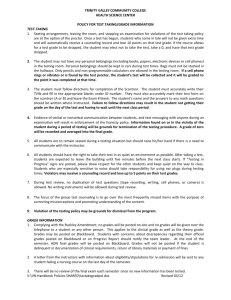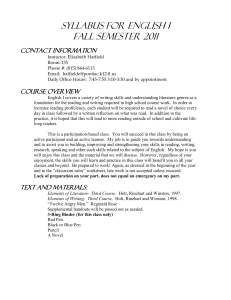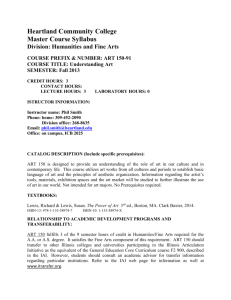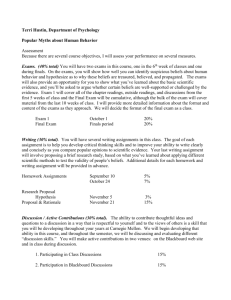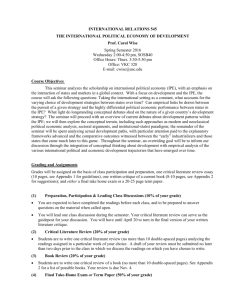GER 386.3, Enlightenment through Realism (c. 1730
advertisement
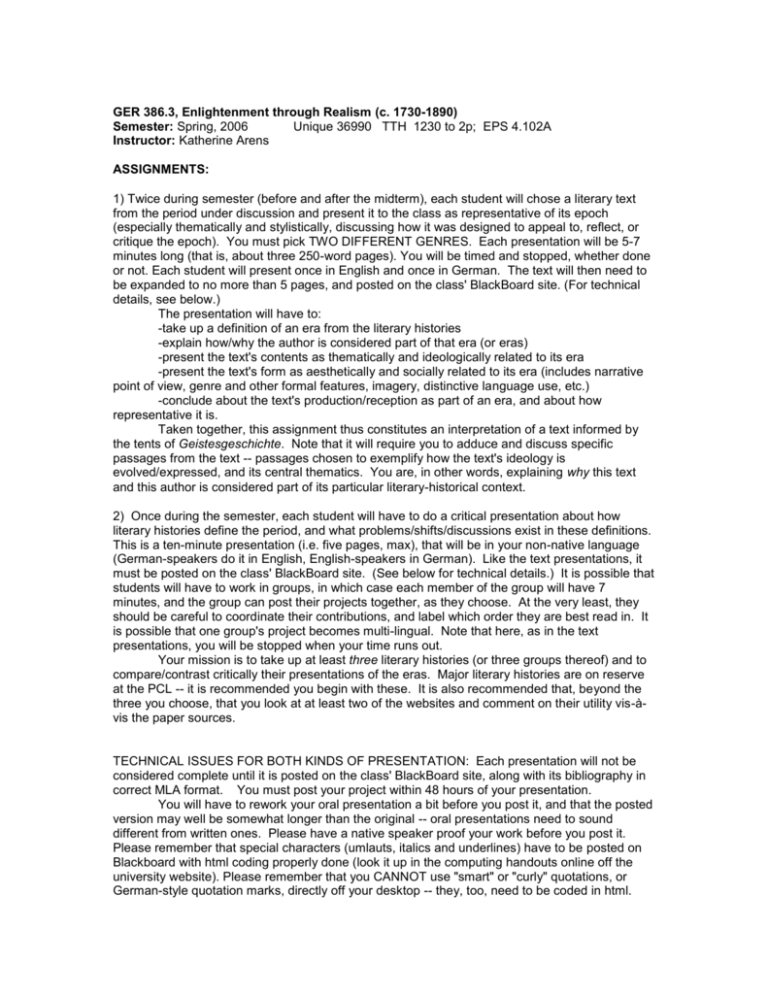
GER 386.3, Enlightenment through Realism (c. 1730-1890) Semester: Spring, 2006 Unique 36990 TTH 1230 to 2p; EPS 4.102A Instructor: Katherine Arens ASSIGNMENTS: 1) Twice during semester (before and after the midterm), each student will chose a literary text from the period under discussion and present it to the class as representative of its epoch (especially thematically and stylistically, discussing how it was designed to appeal to, reflect, or critique the epoch). You must pick TWO DIFFERENT GENRES. Each presentation will be 5-7 minutes long (that is, about three 250-word pages). You will be timed and stopped, whether done or not. Each student will present once in English and once in German. The text will then need to be expanded to no more than 5 pages, and posted on the class' BlackBoard site. (For technical details, see below.) The presentation will have to: -take up a definition of an era from the literary histories -explain how/why the author is considered part of that era (or eras) -present the text's contents as thematically and ideologically related to its era -present the text's form as aesthetically and socially related to its era (includes narrative point of view, genre and other formal features, imagery, distinctive language use, etc.) -conclude about the text's production/reception as part of an era, and about how representative it is. Taken together, this assignment thus constitutes an interpretation of a text informed by the tents of Geistesgeschichte. Note that it will require you to adduce and discuss specific passages from the text -- passages chosen to exemplify how the text's ideology is evolved/expressed, and its central thematics. You are, in other words, explaining why this text and this author is considered part of its particular literary-historical context. 2) Once during the semester, each student will have to do a critical presentation about how literary histories define the period, and what problems/shifts/discussions exist in these definitions. This is a ten-minute presentation (i.e. five pages, max), that will be in your non-native language (German-speakers do it in English, English-speakers in German). Like the text presentations, it must be posted on the class' BlackBoard site. (See below for technical details.) It is possible that students will have to work in groups, in which case each member of the group will have 7 minutes, and the group can post their projects together, as they choose. At the very least, they should be careful to coordinate their contributions, and label which order they are best read in. It is possible that one group's project becomes multi-lingual. Note that here, as in the text presentations, you will be stopped when your time runs out. Your mission is to take up at least three literary histories (or three groups thereof) and to compare/contrast critically their presentations of the eras. Major literary histories are on reserve at the PCL -- it is recommended you begin with these. It is also recommended that, beyond the three you choose, that you look at at least two of the websites and comment on their utility vis-àvis the paper sources. TECHNICAL ISSUES FOR BOTH KINDS OF PRESENTATION: Each presentation will not be considered complete until it is posted on the class' BlackBoard site, along with its bibliography in correct MLA format. You must post your project within 48 hours of your presentation. You will have to rework your oral presentation a bit before you post it, and that the posted version may well be somewhat longer than the original -- oral presentations need to sound different from written ones. Please have a native speaker proof your work before you post it. Please remember that special characters (umlauts, italics and underlines) have to be posted on Blackboard with html coding properly done (look it up in the computing handouts online off the university website). Please remember that you CANNOT use "smart" or "curly" quotations, or German-style quotation marks, directly off your desktop -- they, too, need to be coded in html. Points will be docked for no-html postings that don't have these characters/underlines/italics done correctly, and for MLA mistakes. (The BlackBoard posting window allows you to choose html coding.) EXAMINATIONS: The midterm and final will both have some short answer/identification items and some essays. Each will expect that you have finished some of the longer works that you have just sampled as part of day-to-day reading (note that there is a suggestion of good things to read as part of the booklist, but you are encouraged to thread your own way through choices, using this class' list in conjunction with the department's reading list, so that you can tailor your choices to your own interests). All essay questions will be written so as to allow choices. Make sure that you have mastered something from drama, fictional prose, a handful of poems, and an essay from each major period. Essays will be constructed on patterns familiar from the department's preliminary examination, requiring you to set texts into period contexts, critique period definitions, and discuss details of plot, imagery, narrative point of view, genre criteria, and the like. Each test will contain at least one "blind passage" from a text you may or may not have read. You will argue it as part of a particular period/movement on the basis of internal evidence -this strips text interpretation to the particulars of close reading and requires that you do indeed know the typical stylistic features associated with texts in particular eras. Oh, yes, that passage may be printed in Fraktur. Learn to read it, period. The Midterm will be a timed take-home exam, with time limits set for each of its sections. The Final will be a Klausur, with a take-home portion. It will be comprehensive, including materials from the whole semester. The Midterm may be written in any language; the Final will require you to write one essay in the language you have not used yet (either English or German), just as is done in the Preliminary Examinations.

